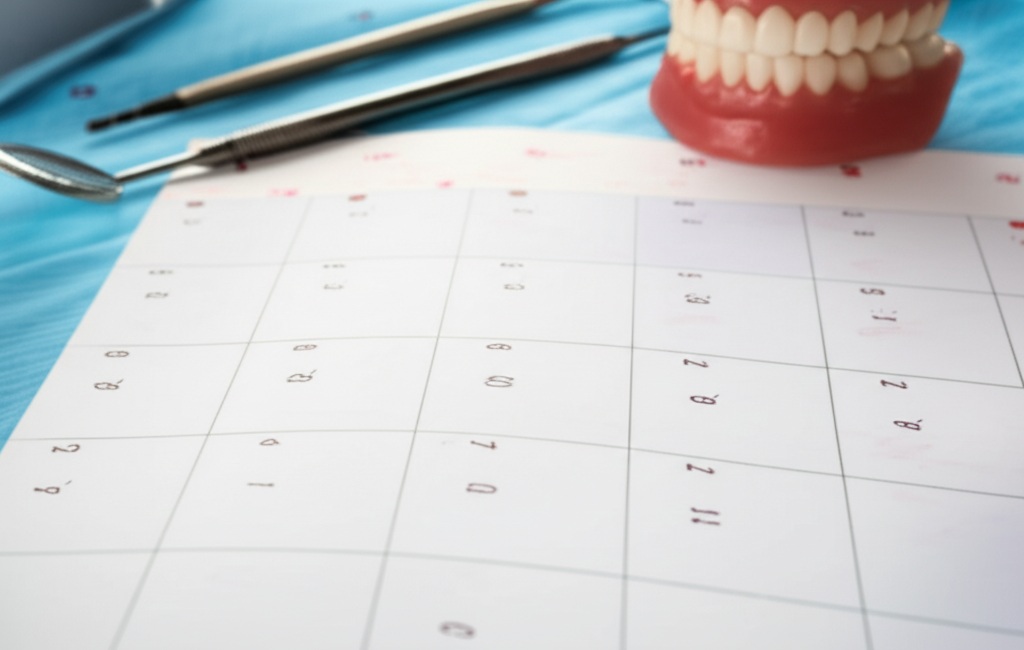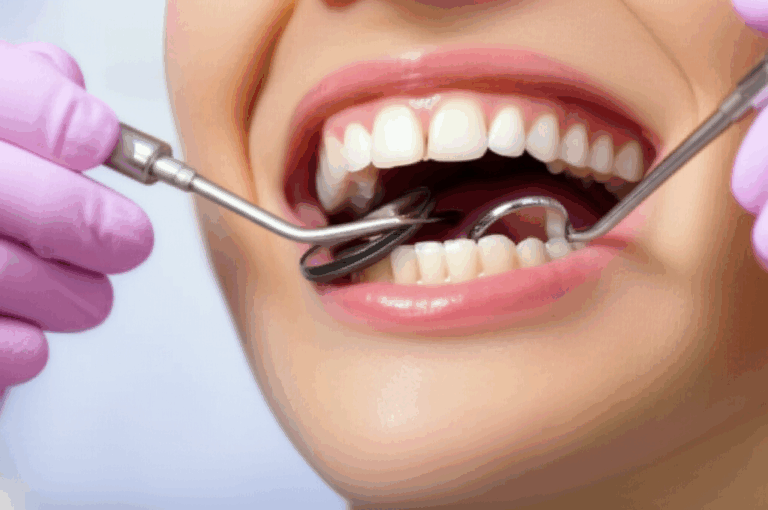
How Many Dentist Visits Does It Take to Get Dentures?
Your Complete Guide to the Denture Journey and What to Expect
Imagine this: You’re sitting in your dentist’s chair, a bit nervous and full of questions. You know you need dentures, but you don’t know how long it takes or how many times you’ll be back in that chair. Maybe someone told you they had to go to the dentist “all the time” for their dentures, and now you’re worried—will you always be at the dentist?
If this sounds like you, you’re not alone. Lots of people feel nervous and unsure when they start with dentures. Here’s the good news: You have every right to ask, “How many visits will I actually need for dentures?” I’m here to explain every step, clear up the confusing parts, and help you feel ready and calm. Let’s break it all down so you know exactly what to expect.
In This Article
- The Real Question: How Many Visits for Dentures Is Normal?
- The Simple Science: What Happens at Each Visit?
- Types of Dentures and How They Change Your Timeline
- Factors That Can Speed Up or Slow Down Your Denture Process
- What Happens After You Get Your Dentures? (Long-Term Care & Maintenance)
- Are You a Good Candidate for Dentures?
- Your “Denture Journey” Takeaway: Steps to a Confident Smile
- Frequently Asked Questions
The Real Question: How Many Visits for Dentures Is Normal?
So, how many times do you actually need to go to the dentist for dentures? There isn’t just one answer, but there is a normal range.
Most people will need 5 to 7 dentist visits for regular full or partial dentures. That’s not counting extra things, like pulling teeth, healing time, or special dentures like “immediate” or implants. Some people need a few more visits, mostly for extra checking and fixing. Others might need less if their mouth is already healthy.
So, no—you won’t be living at the dental office! But yes, you’ll want to keep your calendar close, because every visit is important for making your dentures fit well, look right, and feel good.
Let’s dig deeper and see what really happens at each visit.
The Simple Science: What Happens at Each Visit?
Maybe you’re thinking dentures are made with strange molds, lots of fittings, and some sort of secret lab work. Actually, getting dentures is a step-by-step plan. Think of it like building a house. You wouldn’t move in on day one—first, they lay the base, then build walls, do the plumbing, and finally finish. Dentures are kind of the same.
The Standard Denture Process: Step-by-Step
Visit 1: First Check & Talk
This is your first visit. The dentist will:
- Look over your health and medical history
- Check your mouth, gums, teeth, and bones
- Take first impressions (molds) of your mouth—like a “guide map” for your dentures
- Talk about your options, answer questions, and plan out your treatment
You’ll leave knowing what the next steps will be.
Visit 2: Better Impressions
Here, your dentist makes more exact molds. They’ll:
- Use special materials to get very detailed molds of your gums (and teeth, for partials)
- Send these to a removable denture lab to be made just for you
These dentures are not “one-size” for everyone—they’re made to fit your mouth.
Visit 3: Bite and Fit Check
Now, it’s about your bite. The dentist will:
- Use soft wax shapes to check how your jaws fit together when you bite down
- Help you pick the size, shape, and shade of tooth for a natural look
- Make sure your new dentures will let you chew and talk easily
This is how your dentist makes sure your new teeth feel “just right.”
Visit 4: Try-In (Wax Test)
This visit is special: You get to try on a rough version of your denture (the teeth are set in wax).
- Check how the teeth look, how the “gums” look, your smile, and even your speech
- Tell the dentist what feels or looks off so they can tweak and fix it
It’s like trying on shoes before you buy them—except a lot more important!
Visit 5: Final Denture Fitting
Finally, you get your finished dentures.
- The dentist puts the dentures in, making sure they’re snug and comfy
- You’ll get tips on cleaning, putting in and taking out, and how to eat with your new teeth
- It’s normal if things feel weird or a little sore at first
Visit 6 and After: Fixing & Check-Ups
Your mouth needs some time to get used to the dentures. Plan for:
- 1 to 3 or more follow-ups, especially in the first few weeks or months as your gums settle and if any sore spots pop up
- Minor reshaping or re-fitting if needed
- Your dentist’s team will help you—always call if something doesn’t feel right
So, as you see, dentures are not “one and done.” You, your dentist, and skilled lab workers (sometimes from a china dental lab) work as a team.
Types of Dentures and How They Change Your Timeline
Not all dentures are the same, and the type you get changes how many visits you’ll need.
Conventional (Full or Partial) Dentures
- Usual way, like explained above.
- 5-7 visits is normal (sometimes less for partials, depending on your needs).
Immediate Dentures: “Teeth-in-a-Day” (But There’s a Catch)
Immediate dentures are made before they pull your teeth and given to you the same day as your teeth come out. You won’t go without teeth, but:
- You might need extra early visits (to make molds with your real teeth still there)
- After you get them, you’ll come in often (3-5 or more times) to adjust as your gums shrink and heal
- About 6-12 months later, your mouth might change enough that you’ll need a reline or a new set
Immediate dentures are like a “starter kit” for your smile. Fast and helpful, but they need extra work to keep feeling good.
Partial Dentures
Making partial dentures is like full ones, but:
- Focus is on making the new teeth blend in and connect safely to your real teeth
- There might be less checking later, but you still might need a couple of visits
Implant-Supported Dentures (Overdentures)
This is where modern dental tricks come in. These dentures “snap” onto small anchors in your jaw (dental implants)—kind of like click-on buttons for your teeth.
- First Phase: Surgery — You’ll need visits for talks, scans, implant surgery, and checks while you heal. Healing can take months.
- Second Phase: Building Your Dentures — Once healed, the usual denture steps start: molds, bite checks, try-ins, and delivery.
You might need 8-10 visits in total, depending on how tricky your case is. But the trade-off is you get stronger, longer-lasting dentures.
Factors That Can Speed Up or Slow Down Your Denture Process
Every mouth is different, so every denture experience is too! Here’s what can change your number of visits:
- Tooth Removal: If you need teeth pulled, you’ll wait to heal (unless you get immediate dentures).
- Healing Time: Some people heal quickly, others take longer.
- Mouth and Bone Shape: If your jawbone is tricky, you might need extra visits to adjust things.
- Lab Speed: Some labs are fast (like a digital dental lab using 3D printing), others are slower because everything is done by hand.
- Perfection: If you want your dentures “just so,” expect a few more visits to get things perfect.
- Dentist’s Habit: Some dentists do things in more careful steps, some go a bit quicker if your case allows.
Be flexible, keep talking to your dentist, and don’t miss adjustment visits! They make a big difference to your comfort.
What Happens After You Get Your Dentures? (Long-Term Care & Maintenance)
Are you done when the dentures go in? Not really! Just like a car needs oil changes and check-ups, your dentures do too:
Yearly Check-Ups
- Visit your dentist once a year for a mouth and denture check, even if things feel fine.
Relines and Rebasing
- Your mouth changes shape as you get older. Dentures can get loose or sore.
- Relining is when the dentist reshapes the bottom of your denture to fit your gums better.
- Rebasing is when you get a new base (the pink gum part) while keeping the same denture teeth.
Repair Visits
- If you drop your dentures, or a tooth breaks, you’ll need a quick repair to keep them working.
Daily Cleaning
- Clean your dentures gently, no harsh cleaners.
- Don’t sleep with your dentures in unless the dentist says it’s okay.
- Brush your gums, tongue, and any leftover teeth every day too.
Working together with your dental team keeps your dentures comfy and looking good for a long time.
Are You a Good Candidate for Dentures?
Most people can get dentures, but sometimes it’s not a straight path. Let’s be honest—dentures are a great fix for many people who’ve lost teeth, but there are a few things to keep in mind.
You might be a good fit if:
- You have lost most or all of your teeth from cavities, gum trouble, or accidents
- Your gums and jawbone are healthy enough to hold dentures
- You’re ready to come in for follow-ups, look after your mouth, and maybe change how you eat a bit
- You want to chew, eat, talk, and smile with more confidence
You might not be a good fit if:
- You have trouble sticking with doctor’s instructions or keeping your mouth clean
- Your jawbone is very thin and won’t hold dentures (though special dentures with implants or extra adjustments may help)
- You have big health problems, like healing issues, that make things tricky
Your dentist will talk you through what’s possible and help with other ideas if regular dentures won’t work for you.
Your “Denture Journey” Takeaway: Steps to a Confident Smile
Let’s pull it all together with some simple tips. Here’s how to make your denture experience as easy and positive as possible:
The Big Picture
- Plan for about 5 to 7 dentist visits for usual dentures. More if you go for implants or “immediate” dentures, less if you only need partial and have no mouth trouble.
- Every visit matters: These include talking it over, getting molds, checking your bite, trying on, final fitting, and important follow-ups.
- Getting used to dentures takes time: It’s normal to have sore spots or loose feeling the first while.
Tips for a Better Experience
- Be open with your dentist about your needs and worries.
- Don’t be afraid of a few visits—they help you get it comfortable and just right.
- Ask about new options: Digital dentures, implant dentures, and new materials from advanced labs are making dentures more precise and comfy than ever.
- Learn how to clean and handle your dentures from day one. Even the best dentures need gentle care.
Empower Yourself
Dentures can really change lives. They help you feel good, eat well, and smile naturally. Yes, the process takes time, but every dentist visit gets you closer to a healthy, happy smile you’re excited to show.
If you’re thinking about dentures, take the first step—book a check-up. Your dentist will explain what your journey looks like and support you all the way.
Frequently Asked Questions (FAQ)
1. Can I get “same-day” or “one-visit” dentures?
You can get “teeth in a day” with immediate dentures, but you’ll need several more follow-up visits for adjustments and maybe a new set later. Quick solutions often mean more check-ups afterward.
2. Does the type of denture change how many appointments I’ll have?
Yes. Immediate and implant dentures need extra steps, and easy partials might need less. Your gum health, mouth shape, and healing speed all affect your schedule.
3. What happens if I skip my adjustment appointments?
Missing “tune-up” visits might mean pain, loose dentures, or even mouth injury. These check-ups are important for your new smile!
4. My dentures feel loose after a few months—is that normal?
Yes! Your mouth changes over time. Your dentist can reline or refit your dentures. Going in for yearly check-ups helps spot issues early.
5. What do I do if I want dentures?
Book a visit with your dentist. They’ll check your mouth, talk through your options, and make a plan that’s just for you.
Bringing It All Home: Your Smile, Your Journey
Getting dentures is a group effort. You, your dentist, and sometimes dental labs (like a dental ceramics lab) all work together to bring back your comfort, health, and confidence.
Remember, each step brings you closer to eating your favorite foods, laughing, and smiling big. Bring all your questions and hopes to your dentist, and know that being informed makes your denture journey more enjoyable and rewarding.
Ready for your next step? Talk to your dentist and start your journey to a brighter, healthier smile.
References:
- American Dental Association (ADA): Complete and Partial Dentures
- National Institute of Dental and Craniofacial Research: Dentures and Oral Health
- Medically reviewed by a licensed dentist
(This article is for general information only. Every person’s treatment is different—always check with your dentist for advice just for you!)








